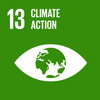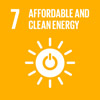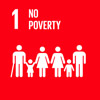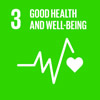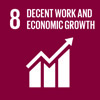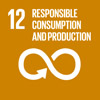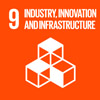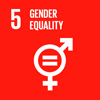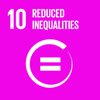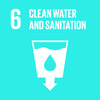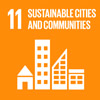Our Corporate Responsibility topics, goals and achievements
For all our Corporate Responsibility Topics we have set goals – some of them quantitative, others qualitative. On the following four pages, we briefly describe why these topics are important for Swiss Re, their principal links to the UN Sustainable Development Goals, the internal goals we have set for them and what we achieved during the reporting year.
Advancing the climate transition
In December 2015, nearly 200 governments agreed to strengthen the global response to the threat of climate change in the Paris Agreement. The private sector plays a key role in reaching the goals defined in Paris. Swiss Re advances the transition to a low-carbon economy from two angles:
1. Managing climate and natural disaster risk is at the core of what we do. Losses from floods, storms, earthquakes and other natural catastrophes impact the economies of entire countries and are therefore a key driver of the re/insurance business. Such losses are becoming more frequent and severe due to higher insurance penetration and the concentration of assets in exposed areas as well as climate change. By financing disaster risk mitigation and climate adaptation, we can strengthen the resilience of citizens, businesses, local and national economies and societies.
2. Advancing sustainable energy solutions is essential to combat global warming. Reducing greenhouse gas emissions while at the same time satisfying the energy needs of a growing population will be one of the great challenges we face in the coming decades. We continuously invest in our renewable energy research and solutions to help our clients and the global community to develop and establish secure energy supplies for the future.
LINKS TO THE UN SUSTAINABLE DEVELOPMENT GOALS*
OUR CORPORATE RESPONSIBILITY GOALS
- For general strategic objectives, see special section on our climate change strategy on Focus: Climate change.
- Based on our commitment made to the UN, advise 50 sovereigns and sub-sovereigns on climate risk resilience by 2020 and offer USD 10 billion of re/insurance protection against this risk.
- Use our capacity and technical expertise to provide effective risk covers for complex offshore wind farm projects.
PROGRESS ON OUR CORPORATE RESPONSIBILITY GOALS
- By the end of 2018, had advised 96 sovereigns and sub-sovereings on climate risk resilience, offering protection of USD 8.2 billion in total (Our commitment to the United Nations).
- We were involved in further offshore wind projects, some of them supporting new trends: accelerated development in Asia and the advent of floating technology (Offshore wind farms).
Partnering for food security
Meeting the demand for food for the growing world population – estimated to reach 9 billion by 2050 – will be challenging, as supply is constrained by such factors as climate change, depleted agricultural soils and the distribution of land, water and energy. Today, about 800 million people – one in 11 – are chronically hungry and malnourished. Swiss Re is a leader in agricultural insurance markets. We use our experience, expertise and financial strength to provide cutting-edge solutions to all stakeholders of the agricultural value chain. By insuring the agricultural sector, we play a vital role in combatting hunger and poverty.
LINKS TO THE UN SUSTAINABLE DEVELOPMENT GOALS*
OUR CORPORATE RESPONSIBILITY GOALS
- In cooperation with key stakeholders, create solutions to improve food security by giving farmers protection against natural perils.
PROGRESS ON OUR CORPORATE RESPONSIBILITY GOALS
- Helped develop a government-run e-voucher scheme in Zambia, which gives smallholder farmers more flexibility to buy the most suitable agricultural inputs and insures these inputs (Supporting an agricultural e-voucher scheme in Zambia).
Offering solutions for longevity risk
People are living longer today than ever before, but the share of the working population is shrinking. The costs of funding retirement income, healthcare and long-term care in old age will increase dramatically. This could have significant financial consequences for individuals, insurers, employer pension funds and society in general. Swiss Re is the world’s largest reinsurer of mortality, and life and health reinsurance is part of our core business. We help clients create solutions that better support people across the different phases of ageing and retirement.
LINKS TO THE UN SUSTAINABLE DEVELOPMENT GOALS*
OUR CORPORATE RESPONSIBILITY GOALS
- Use our capacity, technical expertise and natural offset of our mortality business to offer our clients risk transfer solutions for their longevity risk.
PROGRESS ON OUR CORPORATE RESPONSIBILITY GOALS
- Completed a number of landmark longevity transactions in recent years (Longevity solutions).
Managing sustainability risks
Sound risk management is essential for a re/insurer. Besides the core categories of our risk landscape (insurance, financial market and credit risk), we also pay attention to further significant risks we may be exposed to, including sustainability risks. We define sustainability risks as ethical concerns related to potential environmental and socio-economic impacts of our business transactions, and the reputational risks they may entail. The risk assessments we make through our Sustainability Risk Framework, an advanced risk management instrument, flow directly into our re/insurance and investment decisions.
LINKS TO THE UN SUSTAINABLE DEVELOPMENT GOALS*
OUR CORPORATE RESPONSIBILITY GOALS
- Consistently identify potential sustainability risks in our business transactions and abstain from them if warranted.
- Increase the effectiveness and efficiency of the Sensitive Business Risk (SBR) process by advancing automation of sustainability risk screening with our proprietary SBR Assessment Tool.
- Engage with clients and industry partners on how to address and reduce sustainability risks in business transactions, especially in high growth markets.
PROGRESS ON OUR CORPORATE RESPONSIBILITY GOALS
- Introduced a thermal coal policy for our underwriting and integrated it in our Sustainability Risk Framework (Focus: Introduction of our thermal coal policy).
- Due to continuous fine-tuning of the SBR Assessment Tool and increasing underwriter awareness, achieved a decrease of transactions referred for an individual assessment between 2015 and 2017. In 2018, referrals rose, partly due to the introduction of our thermal coal policy (The Sensitive Business Risk process).
- Had several dialogue engagements with industry peers and civil society groups, in particular focusing on the topic of thermal coal and the policy we introduced in 2018 (Client and industry interaction).
Investing responsibly
Institutional investors such as re/insurers are naturally suited to invest responsibly because of their long-term view. Swiss Re systematically integrates environmental, social and governance (ESG) considerations into the investment process through its three-pillars approach: Enhancement (eg by applying ESG benchmarks), Inclusion (ie thematic investments) and Exclusion.
LINKS TO THE UN SUSTAINABLE DEVELOPMENT GOALS*
OUR CORPORATE RESPONSIBILITY GOALS
- Integrate ESG criteria systematically along our overall investment process.
- Meet our investment target for green bonds of at least USD 1.5 billion.
PROGRESS ON OUR CORPORATE RESPONSIBILITY GOALS
- Close to 100% of our assets under management consider ESG criteria (Being a responsible investor).
- Reached our green bond target during 2018, holding USD 1.6 billion in green bonds at the end of the year (Inclusion).
Engaging our people
We want to be an organisation where diverse talents come together globally to apply fresh perspectives and knowledge to “make the world more resilient”. Once a year, we seek feedback from our employees through the Employee Engagement Survey (EES). The EES is an opportunity to hear from our employees what engages them and what ideas they have to improve their experience at Swiss Re.
LINKS TO THE UN SUSTAINABLE DEVELOPMENT GOALS*
OUR CORPORATE RESPONSIBILITY GOALS
- Continue to build an organisation of diverse people that have a passion to make the world more resilient.
- Achieve a top-quartile employee engagement score (EES>74%).
PROGRESS ON OUR CORPORATE RESPONSIBILITY GOALS
- According to EES scores, 78% of our employees appreciate Swiss Re valuing diversity and having a collaborative, inclusive and friendly culture with high integrity (Listening to our employees).
- Per 2018, achieved an employee engagement score of 66% (Listening to our employees).
Ensuring good corporate governance and compliance
We consider good corporate governance as a key precondition to ensure sustainability throughout the Group’s activities and indispensable to maintaining long-lasting, valuable relationships with our stakeholders. We conduct business in a legal, fair, ethical and transparent way by adhering to best practices at all times, and apply the principles of our Code of Conduct across all company lines and regions.
OUR CORPORATE RESPONSIBILITY GOALS
- Continuously assess our corporate governance against regulatory developments, best practice and new stakeholder demands.
- Manage compliance risks through maintaining adequate frameworks, delivery of effective training and awareness to our employees and oversee effective implementation within the business.
PROGRESS ON OUR CORPORATE RESPONSIBILITY GOALS
- For an overview of key focus areas and highlights in 2018, see our 2018 Financial Report.
- Launched global internal Compliance tool to simplify employee access to compliance risk framework and governance information. Delivered mandatory compliance trainings. Risk-based tailored training activities for targeted employees continued (Code of Conduct).
Reducing our environmental footprint
As a knowledge company in the financial services sector, our environmental impacts through our own operations are limited. Nonetheless, we firmly believe it is important for a responsible company to minimise its environmental footprint, thus leading by example. Tackling our CO2 emissions and reducing energy consumption are key targets across the Group. Our pioneering initiatives include the Greenhouse Neutral Programme and the COyou2 Programme.
LINKS TO THE UN SUSTAINABLE DEVELOPMENT GOALS*
OUR CORPORATE RESPONSIBILITY GOALS
- Keep per-capita CO2 emissions from our own operations at 2013 levels, which we had reduced by 49.3% in the ten years since 2003.
- Reduce our energy intensity by an average 2% per year.
- Obtain 100% of power used for our own operations from renewable sources by 2020.
- Include our tier 1 and tier 2 vendors in the EcoVadis platform by 2020.
PROGRESS ON OUR CORPORATE RESPONSIBILITY GOALS
- Achieved a reduction of our per-capita CO2 emissions by 8.1% compared with 2013 (Goals and scope).
- Since 2013, achieved a total reduction of 28.9% (Reducing energy consumption).
- At the end of 2018, covered 94% of our total power consumption from renewable sources (Renewable energy and RE100/EP100).
- Implementation completed for 30% of our tier 1 and 2 vendors (Sustainability in our supply chain).
Advancing access to insurance
Access to insurance is an important contributor to economic development. However, 60% of the world’s population still remains excluded from appropriate insurance products. We work on advancing public awareness of the societal value of insurance and the role insurance plays in achieving sustainable economic development. We further evaluate our contribution on selected Sustainable Development Goals (SDGs).
LINKS TO THE UN SUSTAINABLE DEVELOPMENT GOALS*
OUR CORPORATE RESPONSIBILITY GOALS
- Advance our understanding of the societal impact of insurance and develop metrics to measure our impact on stakeholders.
PROGRESS ON OUR CORPORATE RESPONSIBILITY GOALS
- Based on our dedicated sigma study of 2017, continued in-house work towards developing a suitable methodology. No reportable results yet as per end of 2018.
Navigating the digital transformation
The digital transformation has the potential to radically transform the insurance industry. New analytical techniques such as smart analytics, Big Data and FinTech boost innovation and modernisation in product design, distribution, claims management and fraud detection. As Swiss Re develops its “digital DNA”, we are also advancing industry awareness of ethical challenges surrounding the digital transformation.
OUR CORPORATE RESPONSIBILITY GOALS
- Refine our understanding of societal challenges related to the digital transformation.
PROGRESS ON OUR CORPORATE RESPONSIBILITY GOALS
- Engaged with regulators on the topic of big data/digital ethics, continued a research partnership on “Ethical and Legal Big Data Challenges in the Insurance Industry” with academic partners and contributed to a publication produced by the Geneva Association (Focus: Digital responsibility).
Empowering communities
The Swiss Re Foundation reflects the social and humanitarian values of Swiss Re. It partners with social entrepreneurs, aid organisations, researchers, Swiss Re employees and clients to help communities increase their resilience. The Foundation’s initiatives address the causes and effects of risks in four areas – climate, natural hazards, water and society – both in emerging and developing countries and in regions where Swiss Re has offices.
LINKS TO THE UN SUSTAINABLE DEVELOPMENT GOALS*
OUR CORPORATE RESPONSIBILITY GOALS
- Contribute to resilient societies by increasingly engaging Swiss Re employees with their skills and expertise.
PROGRESS ON OUR CORPORATE RESPONSIBILITY GOALS
- Continuing to create new opportunities for our employees to support the Swiss Re Foundation’s partners with their expertise, nearly 16% of the project portfolio encompassed an employee engagement component at the end of 2018 (see 2018 Foundation Report, pages 26-27).
* Note: SDG 17 “Partnerships for the Goals” is important for most of our CR Topics.
